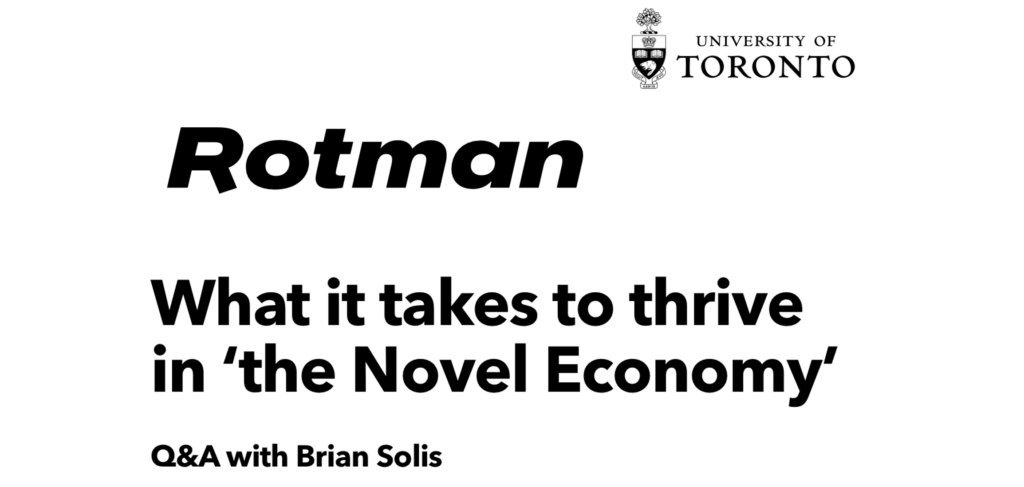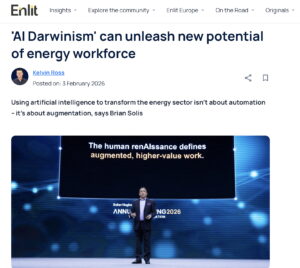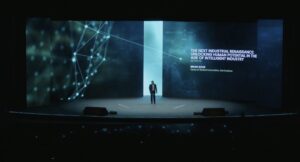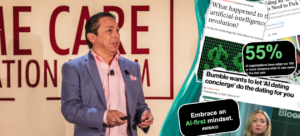
Disrupt yourself — or be disrupted.
We’re not easing into the future. We’re being thrown into it, wave after wave. And most businesses are still optimizing yesterday instead of inventing tomorrow.
We now live in a Novel Economy — where change is constant, disruption is a given, and a mindset shift isn’t optional.
The future is already here. And I believe it happens to you or because of you.
The disruptions we faced over the years, political, societal, technological, aren’t slowing down or easing up. And yet we with every wave that arrives, we react. We navigate. We adapt and learn to become more resilience. Some leave that work to others and some don’t see the need to change at all. But for the most part, at scale, we don’t study the future, seek the next disruption, or forecast scenarios to thrive against the unknown. We don’t anticipate. Even in the present, we don’t transform against current waves of disruption. Combined with not innovating toward a future we can learn to see and expect, and to some extent, model, we continue to script disruption in to the playbook of business as usual.

Welcome to the Novel Economy
We now live in a Novel Economy. The word ‘novel’ simply means new or unusual, and through an optimistic lens, in an interesting way. And when everything is new or unusual, innovation becomes a catalyst for creating a future that wouldn’t have existed without you. At its core, innovation is about creating new value, something new that you didn’t or couldn’t do yesterday. Compare that to iteration, where we improve what we did yesterday to work better tomorrow. It’s iteration, not innovation, at scale, that represents how organizations and leaders are responding to disruption.
Scaling yesterday’s thinking won’t solve tomorrow’s problems. At some point, iteration eventually accelerates irrelevance or worse, obsolescence.
Some of the disruptive examples off the top of my head include 2015 (BREXIT), 2016 (U.S. election) 2020 (pandemic), 2022 (generative AI), 2024 (U.S. election), 2025 (rise of AI agents and agentic enterprises), 2026–2027 (the rise of AI employees), 2030 (the shift to autonomous functions). It seems that we haven’t quite accepted our new reality, that scaling business as usual, making it more efficient and cost effective, and optimizing yesterday’s work isn’t the moonshot that will help today’s companies thrive in a future where disruption is not only a given, it’s unknown, uncharted, and as such, a threat.
It’s time for a mindshift.
Without a mindshift, tomorrow’s North Star looks a lot like it did yesterday. And at some point, disruption becomes insurmountable.
If you’re waiting for someone to tell you what to do, you are on the wrong side of disruption. To become better, to find answers, to finding meaning and direction in the unknown, to lead against disruption, you must first disrupt yourself.
Become the disruptor vs. the disrupted.
What it takes to thrive in ‘the Novel Economy’
Recently, I sat down with Karen Christensen, Editor in Chief, of Rotman Management Magazine to explore what it takes to thrive in a Novel Economy. It would mean a lot if you could make time to give it a read and share your thoughts and ideas with me.


The following is a list of questions we explore…
You refer to our current environment as ‘the Novel Economy.’ How do you define that term — and why does it demand a ‘mindshift’ from individuals and organizations?
Describe the difference between microtrends, macrotrends and megatrends — and why we need to keep an eye on all of them.
You believe that a self-aware mind is a shiftable mind. Please explain.
What key lessons have you learned from working closely with companies like Airbnb, Uber and Spotify?
Describe the mindshift(s) that Ford has made in order to compete with Tesla.
Please briefly summarize the six stages of your mindshifting framework.

Please briefly summarize the six stages of your mindshifting framework.
Why are a Beginner’s Mind and a Growth Mindset particularly valuable in the Novel Economy?
What can a leader do to foster a growth mindset on their team?
For readers who want to embrace mindshifting, what are the first steps?
Please do give it a read, and let’s become the leaders for a better tomorrow, together!





You refer to our current environment as ‘the Novel Economy.’ How do you define that term — and why does it demand a ‘mindshift’ from individuals and organizations?